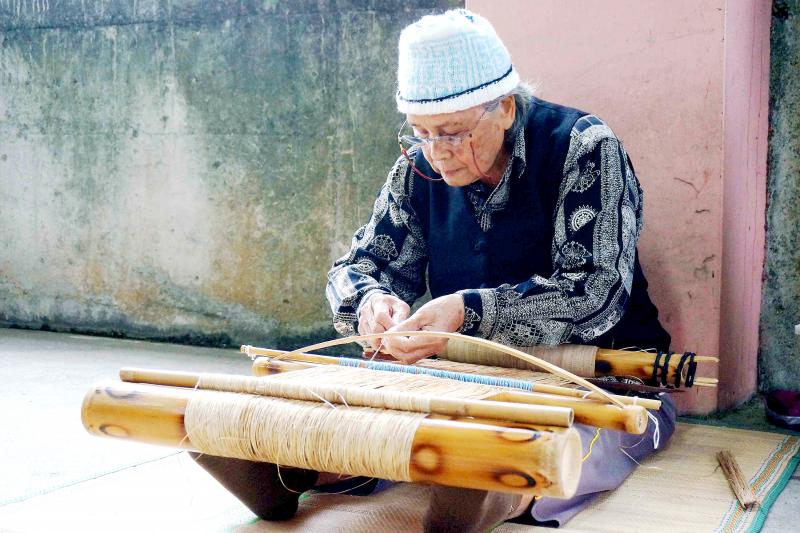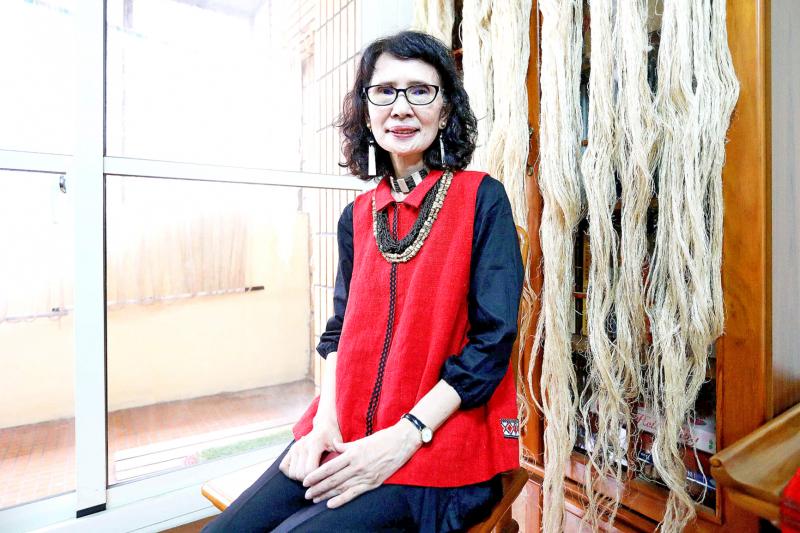The Ministry of Culture has designated two traditional Aboriginal weaving techniques as intangible cultural heritage and is to draft plans for their preservation.
The two techniques — gaya tminun of the Seediq and ni tenunan tu benina of the Kavalan — are to be protected under the Cultural Heritage Preservation Act (文化資產保存法), the ministry said in a statement on Monday.
According to Article 92 of the act, the government must draft plans to preserve designated intangible cultural heritage and document, and teach or take measures to preserve and conserve cultural heritage that is on the verge of disappearing.

Photo courtesy of the Ministry of Culture via CNA
It was the first time the traditional craftsmanship of the Seediq and Kavalan — two of Taiwan’s 16 officially recognized Aboriginal communities — has been designated as cultural heritage.
The ministry praised gaya tminun as the embodiment of the Seediq’s weaving culture.
“Fabrics represent the crystallization of culture shared by Seediq women over the past several hundred and even 1,000 years,” the ministry said.

Photo courtesy of the Ministry of Culture via CNA
The ministry also named Chang Feng-ying of the Seediq as the keeper of gaya tminun, and Yen Yu-ying (嚴玉英) the keeper of ni tenunan tu benina.
Chang inherited the weaving technique from her mother and grandmother, and she mastered the most challenging technique, called puniri, that is used to create formal dresses, it said.
Chang is recognized by her community as the most talented and skillful weaver, and she has devoted herself to passing on weaving techniques to others so that the skills and knowledge of puniri can spread, the ministry said.
The ministry described ni tenunan tu benina, which uses banana leaves and mainly consists of a plain weave, as representative of the craftsmanship of the Kavalan.
The technique is “an important cultural feature of a tribal renaissance movement,” and plays a significant role in creating cohesion within Aboriginal groups and in promoting their identity, it said.
The ministry praised Yen as the weaver who is most familiar with all the necessary skills and tools used for weaving with banana leaves, as well as the traditional ritual, called paspaw, performed to pray for blessings from ancestors’ spirits to allow the weaving to proceed without problems.
Yen’s craftsmanship “offers a ray of hope for the preservation of her tribe’s nearly extinct weaving knowledge and culture,” the ministry said.

Taiwan’s Liu Ming-i, right, who also goes by the name Ray Liu, poses with a Chinese Taipei flag after winning the gold medal in the men’s physique 170cm competition at the International Fitness and Bodybuilding Federation Asian Championship in Ajman, United Arab Emirates, yesterday.

Costa Rica sent a group of intelligence officials to Taiwan for a short-term training program, the first time the Central American country has done so since the countries ended official diplomatic relations in 2007, a Costa Rican media outlet reported last week. Five officials from the Costa Rican Directorate of Intelligence and Security last month spent 23 days in Taipei undergoing a series of training sessions focused on national security, La Nacion reported on Friday, quoting unnamed sources. The Costa Rican government has not confirmed the report. The Chinese embassy in Costa Rica protested the news, saying in a statement issued the same

A year-long renovation of Taipei’s Bangka Park (艋舺公園) began yesterday, as city workers fenced off the site and cleared out belongings left by homeless residents who had been living there. Despite protests from displaced residents, a city official defended the government’s relocation efforts, saying transitional housing has been offered. The renovation of the park in Taipei’s Wanhua District (萬華), near Longshan Temple (龍山寺), began at 9am yesterday, as about 20 homeless people packed their belongings and left after being asked to move by city personnel. Among them was a 90-year-old woman surnamed Wang (王), who last week said that she had no plans

TO BE APPEALED: The environment ministry said coal reduction goals had to be reached within two months, which was against the principle of legitimate expectation The Taipei High Administrative Court on Thursday ruled in favor of the Taichung Environmental Protection Bureau in its administrative litigation against the Ministry of Environment for the rescission of a NT$18 million fine (US$609,570) imposed by the bureau on the Taichung Power Plant in 2019 for alleged excess coal power generation. The bureau in November 2019 revised what it said was a “slip of the pen” in the text of the operating permit granted to the plant — which is run by Taiwan Power Co (Taipower) — in October 2017. The permit originally read: “reduce coal use by 40 percent from Jan.